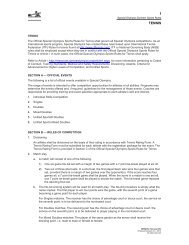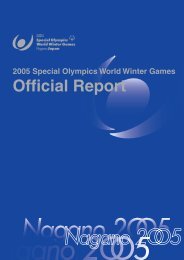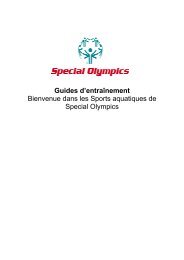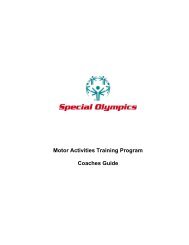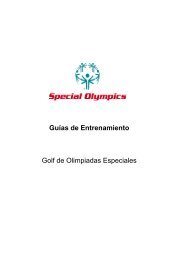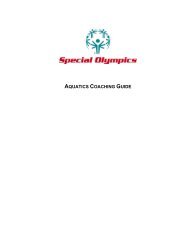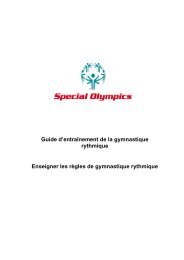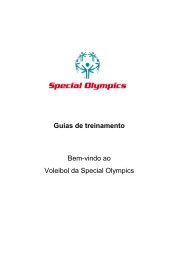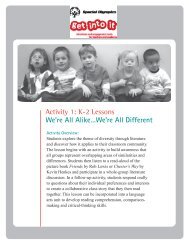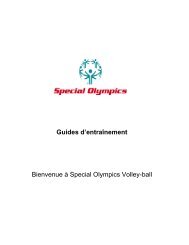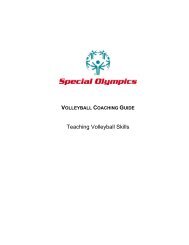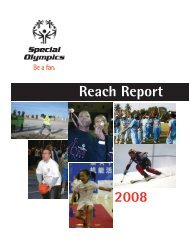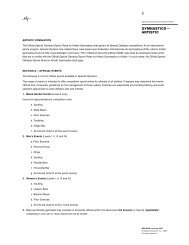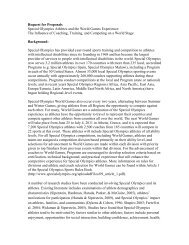BADMINTON Special Olympics Sports Skills Program
BADMINTON Special Olympics Sports Skills Program
BADMINTON Special Olympics Sports Skills Program
You also want an ePaper? Increase the reach of your titles
YUMPU automatically turns print PDFs into web optimized ePapers that Google loves.
8. <strong>Special</strong> <strong>Olympics</strong> encourages qualified athletes to participate<br />
in school, club, and community programs where<br />
they can train and compete in regular sports activities.<br />
The athletes may, at this point, wish to leave <strong>Special</strong><br />
<strong>Olympics</strong> or continue to take part in <strong>Special</strong> <strong>Olympics</strong><br />
activities as well. The decision rests with the athlete.<br />
9. <strong>Special</strong> <strong>Olympics</strong> fully supports the concept of developing<br />
sports events for athletes with intellectual disabilities<br />
in conjunction with events conducted by sports organizations<br />
for individuals without intellectual disabilities. Accredited<br />
P r ograms should encourage other amateur and professional<br />
sports programs to include demonstrations by <strong>Special</strong><br />
O lympics athletes as part of their major events. In addition,<br />
Accredited <strong>Program</strong>s should work with other sports<br />
organizations to develop sports events in which <strong>Special</strong><br />
<strong>Olympics</strong> athletes may compete with individuals who do<br />
not have intellectual disabilities. This can occur under<br />
circumstances that offer <strong>Special</strong> <strong>Olympics</strong> athletes realistic<br />
opportunities to excel and compete successfully, whether<br />
by participating in the same heats as all athletes or in<br />
heats organized specifi c a l ly for <strong>Special</strong> <strong>Olympics</strong> athletes.<br />
<strong>Special</strong> <strong>Olympics</strong> personnel should work to create a<br />
feasible format for these integrated activities.<br />
10. All <strong>Special</strong> <strong>Olympics</strong> sports training and competition<br />
activities and events shall be conducted in accordance<br />
with the General Rules, these Official <strong>Sports</strong> Rules, and<br />
the other uniform standards. Each Accredited <strong>Program</strong><br />
shall offer sports training and competition programs that<br />
meet the highest possible standards in facilities and equipm<br />
e n t ,athletic attire, training, coaching, officiating, admini<br />
s t r a t i o n ,and related events for athletes and their fa m i l i e s .<br />
<strong>Special</strong> <strong>Olympics</strong> sports training and competitions must<br />
be held in a manner that protects the participating athletes,<br />
provides fair and equitable conditions of competition,<br />
and promotes uniformity in testing athletic skills, so that<br />
no competitor obtains an unfair advantage over another.<br />
11. <strong>Special</strong> <strong>Olympics</strong> believes that every athlete deserves<br />
an equal chance to excel during competition. Thus each<br />
competition division within a given event must be structured<br />
so that every athlete/team in the division has a<br />
r e a s o n a ble chance to excel during competition. This must<br />
be done by placing athletes/teams in divisions according<br />
to accurate records of previous performance or trial heats<br />
and, when relevant, grouping them by age and gender.<br />
12. <strong>Special</strong> <strong>Olympics</strong> seeks to promote the spirit of sport s -<br />
m a nship and a love of participation for its own sake by<br />
stressing and celebrating the importance of, and personal<br />
achievement associated with, each athlete’s participation<br />
and personal effort in <strong>Special</strong> <strong>Olympics</strong>, regardless of<br />
comparative ability. <strong>Special</strong> <strong>Olympics</strong> believes that every<br />
athlete should participate to his or her fullest potential.<br />
8<br />
This means that in team sports, each coach must see to it<br />
that each athlete has frequent opportunities to part i c i p a t e .<br />
This also means that each Games and tournaments should<br />
offer as many sports as possible, with events for athletes<br />
of all ability levels. <strong>Special</strong> <strong>Olympics</strong> promotes this<br />
philosophy in the training of its coaches and officials.<br />
13. All <strong>Special</strong> <strong>Olympics</strong> Games and competitions at the local,<br />
state, national, and international levels reflect the values,<br />
standards, traditions, ceremonies, and activities embodied<br />
in the ancient and modern <strong>Olympics</strong> Movement, broadened<br />
and enriched to celebrate the moral and spiritual qualities<br />
of persons with intellectual disabilities so as to enhance<br />
their dignity and self-esteem.<br />
14. At Accredited <strong>Program</strong> competitions, Regional Games,<br />
World Games, and other <strong>Special</strong> <strong>Olympics</strong> Games,<br />
official medals shall be presented to first, second, and<br />
third place winners. Athletes in fourth through eighth<br />
places shall receive ribbons with all appropriate ceremonies.<br />
Those who are disqualified (for reasons other<br />
than unsport s m a n l i ke conduct or violations of the div i s i o n -<br />
ing ru l e s ) or do not finish an event shall be given a<br />
p a rticipation ribbon. For competitions below the Accredited<br />
<strong>Program</strong> level (that is, at the local level), ribbons or a<br />
combination of medals and ribbons may be awarded.<br />
1 5 . <strong>Special</strong> <strong>Olympics</strong> training and competition activities must<br />
take place in public, with every effort made to attract<br />
spectators and generate coverage by the news media, in<br />
order to increase public awareness of and support the need<br />
and capabilities of persons with intellectual disabilities.<br />
16. <strong>Special</strong> <strong>Olympics</strong> shall offer every athlete multiple<br />
opportunities annually to participate in locally based<br />
competitions in Official <strong>Sports</strong> and Nationally Popular<br />
<strong>Sports</strong> in which he or she is interested. These activities<br />
should include competitions with teams or individuals<br />
other than those with whom the athlete usually trains.<br />
Each Accredited <strong>Program</strong> must offer competition<br />
opportunities in at least the number of Official <strong>Sports</strong><br />
and/or Nationally Popular <strong>Sports</strong> required by the<br />
Accreditation Criteria for that <strong>Program</strong>’s Accreditation<br />
Level. In addition, in order to give athletes broader<br />
opportunities, area, state, provincial, Regional, national,<br />
and international competitions as well as tournaments<br />
shall, subject to available resources, be open to athletes<br />
representing the full range of skill levels.<br />
17. <strong>Special</strong> <strong>Olympics</strong> is not designed to train elite athletes<br />
exclusively but does provide training and competition<br />
for highly skilled and elite athletes with intellectual<br />
disabilities. Fair and equitable methods are used to select<br />
athletes for participation in nonlocal competitions so that y<br />
every athlete has an equal opportunity to participate in<br />
each competition at his or her skill level.



